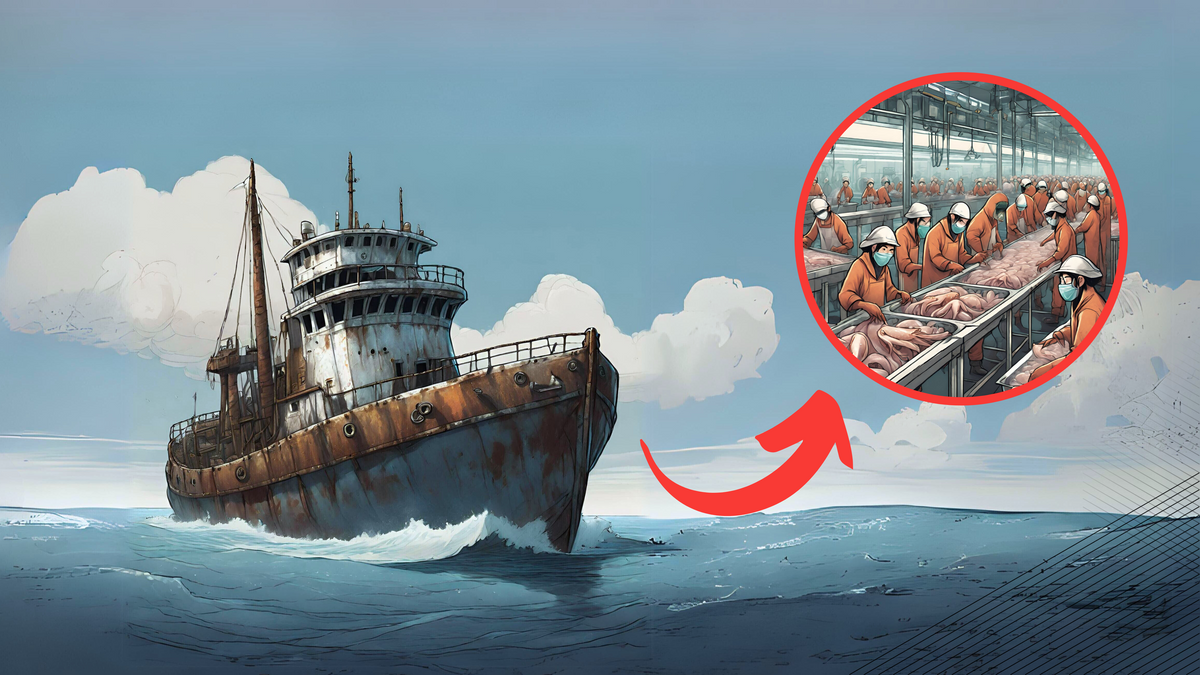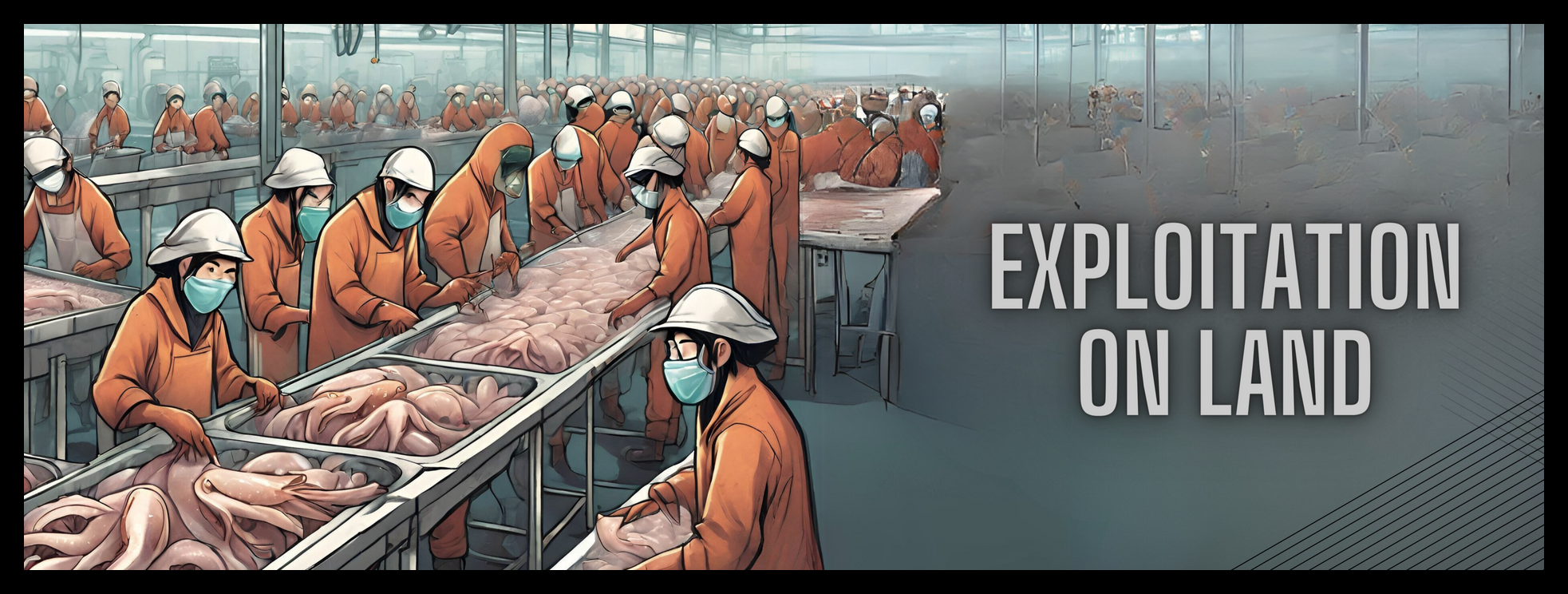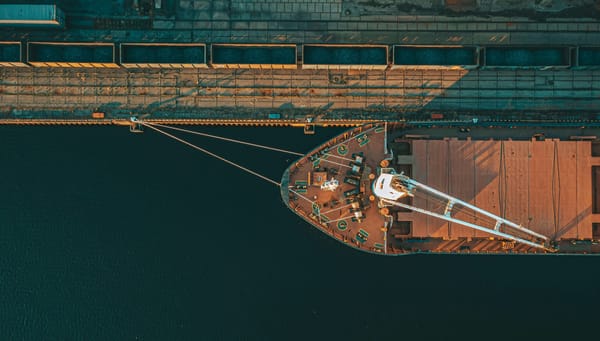What to Know and Expect from New Reporting on Slavery in China's Squid Supply Chain

Yesterday The New Yorker published two lengthy exposés from indie journalist Ian Urbina on China's labor abuse in the seafood sector (citations below). They claim that 17% of the squid imported to the US was processed by forced laborers in China, some of it harvested by fishers enslaved on Chinese fishing boats. Here are the key takeaways for industry from both pieces and my thoughts on the policy changes and advocacy this reporting might ignite.

At a high level, Urbina paints China's thousands of fishing vessels operating on the high seas as a heavily subsidized network of quasi-military assets that, beyond the fish they catch, provide political cover for and some enforcement of China's global interests. His personal on-the-water observations of China's squid fleet in recent years include watching vessels operate in North Korea's national waters (in violation of UN sanctions) and fail to log their catch in the Falkland Islands. Stories from crew detail examples of every International Labor Organization indicator of forced labor: deception, restriction of movement, isolation, physical and sexual violence, intimidation and threats, retention of identity documents, withholding of wages, debt bondage, abusive working and living conditions and excessive overtime.
Urbina focuses in on a supply chain that starts aboard the Zhen Fa 7, a Chinese squid fishing vessel operating primarily in international waters off South America with a record of turning off its location transponders for days at a time to presumably poach in Ecuador's national waters undetected. Over a four-year period, Urbina tracked Zhen Fa 7 as its catch was repeatedly transshipped to Shandong, China. Transshipment (moving fish from the harvesting vessel to an intermediary vessel that brings the catch to port) is legal and common in commercial fishing, but in this case the implication is that transshipment was used both to mask the source of illegally harvested seafood and to prevent able-bodied workers from leaving.

Urbina tracked the movement of the Zhen Fa 7's catch from landing in Shandong to several domestic seafood processing plants that send squid and other seafood products to over 60 US importers, including recognizable grocery and food distribution brands. He found evidence of Uyghurs working in at least two of these plants, which the owners denied (a common theme in both articles). Urbina says that per official records, the government sends ~25,000 Uyghurs out of Xinjiang to work elsewhere in China every year. Roughly 1,000 of those workers have ended up in Shandong's seafood processing facilities. At least 450 North Koreans also work in China's seafood processing plants.
The US considers all Uyghur labor to be forced per the Uyghur Forced Labor Prevention Act (UFLPA) and North Korean labor is also forced labor per the Countering America’s Adversaries Through Sanctions Act (CAATSA), barring products made by these workers from US import. The US implements the UFLPA in part by requiring the address of manufacturers associated with imports from China and flagging postal codes from key regions for further review, which can result in detention or seizure. While the laws are clear and measures are both in place and working as intended, this reporting shows that detecting all instances of forced labor in supply chains is much easier said than done. Independent third party audits conducted by multiple reputable companies repeatedly failed to uncover the forced labor Urbina's team found in Shandong seafood processing plants. Passing these audits enabled processors to obtain sustainable seafood certifications and appeal to US companies seeking to go above and beyond import requirements for labor due diligence.
Policy Implications
Bombshell illegal fishing and labor abuse reports like these tend to stir calls for reform that linger for months or even years if public and political interest is high enough. Having been through this a few times here is what I'm expecting - for better or worse:
- Changes to Uyghur Forced Labor Prevention Act enforcement. Urbina says that UFLPA implementation has been ineffective in identifying Uyghur labor in seafood supply chains because it occurs outside of Xinjiang. Former CBP official Ken Kennedy "said [to Urbina] that the U.S. government should block seafood imports from China until American companies can demonstrate that their supply chains are free of abuse." This is unrealistic, but US Customs and Border Protection (CBP) might make changes, such as amending the UFLPA Entity List or adjusting its screening criteria for Manufacturing (MF) Party postal codes based on this new information.
- Increased scrutiny of named vessels, facilities and companies. Across both articles Urbina names Chinese vessels, seafood processing facilities and parent companies that export seafood to the US, as well as a handful of US importers and retailers. They might receive additional scrutiny from applicable enforcement programs which could lead to actions including Withhold Release Orders and sanctions against individuals and their associated companies. Public interest may also be an issue; a grocery store chain told Urbina that it would stop purchasing specific items from one company in response to his inquiries. If you import seafood that was processed in China - particularly Shandong province - contact us (we made a comprehensive list) or read the articles in full to see if parties you work with were named.
- Expanding NOAA's Seafood Import Monitoring Program would be the fastest way for the US to start receiving and - at least theoretically - screening fishing vessels associated with more seafood imports. NOAA included squid in its proposal to expand the program last December but has yet to issue a final rule. The agency might be pressured to finalize its rulemaking sooner than later, or Congress could step in as it did 2018 to force expansion of the program to shrimp and abalone. Urbina stated that US imports of pollock, salmon and crab are processed by Uyghur laborers as well; these species were not included in the proposed expansion. NOAA also has yet to finalize a rule it proposed in July 2022 that would amend the definition of 'Illegal, Unreported and Unregulated fishing' to formally include forced labor, which could open the door to new requirements for data, records and attestations on labor recruitment, conditions etc.
- Unrealistic due diligence and transparency expectations. This investigative reporting was not budget friendly; it documents four years of extensive international travel, on-the-water expeditions, satellite monitoring, private investigator stakeouts, translators, and access to records that would be exceedingly difficult to find without expert help. Ian Urbina's nonprofit Outlaw Ocean Project website doesn't list its funders but a quick Google search found reports of grants from the David and Lucile Packard Foundation, Bloomberg Philanthropies, The Philip Stephenson Foundation and the Fund for Investigative Journalism among others. Beyond cost, these efforts far exceed any reasonable due diligence practice. Nevertheless, showcasing no-holds-barred investigative research always seems to create the impression that if it can be done once, it certainly can be operationalized at scale. It can't - but we can do better within our means.
This is a lot to process, but the problem we are all trying to solve is simple: protect legal operators and consumers by efficiently removing bad actors from global supply chains. There are new cost-effective measures the seafood industry can take to dramatically de-risk their supply chains. For example, manually checking fishing vessel registrations and blacklists is becoming a thing of the past because we automated it with Goldfish. Other companies offer advanced forced labor risk screening based on counterparty information. I will detail some of the challenges and opportunities we have found with forced labor screening in a post coming later this week. In the meantime, consider reading these articles. They are long but thoroughly researched, well written and compelling (note - I was able to view two articles before hitting a paywall):
Ian Urbina (October 9, 2023). The Crimes Behind the Seafood You Eat. The New Yorker This article focuses primarily on the abuse of foreign laborers in China's distant water squid fishing fleet.
Ian Urbina (October 9, 2023). The Uyghurs Forced to Process the World’s Fish. The New Yorker This article focuses primarily on the abuse of laborers from the Xinjaing region in China's domestic seafood processing industry.





